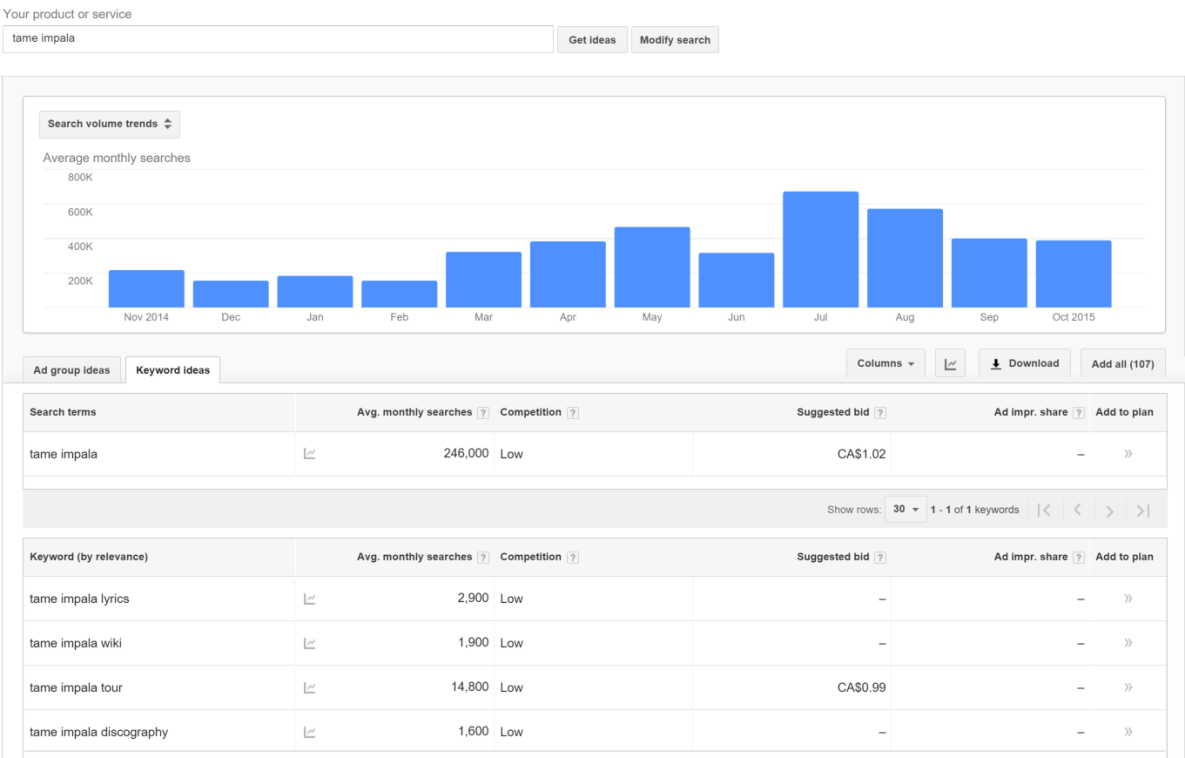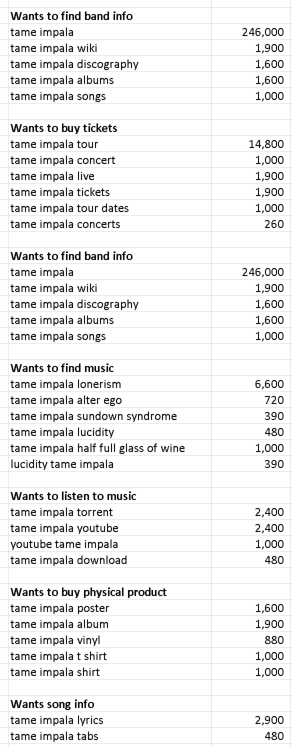Chapter 2: Find Your Band Keywords
Before you start optimizing, it’s crucial that you get to know your keywords. This is always Step #1 in any SEO project, and it’s no exception for musicians.
OK, let’s go.
There is nothing more fundamental to search engines than keywords. Keywords are how we humans directly communicate with the search engines.
There’s a reason the Google homepage is a search bar and nothing else.

It all starts with a keyword.
It’s important for us to think about keywords first because some keywords get searched more often, or less often, than other keywords.

Later on, as you carry on doing SEO for your band, you'll work on things like optimizing your website pages, creating new content for your website, getting backlinks, and stuff like that. It's really important to know what keywords people are using to search for your band when doing that work.
SEO is hard work, and knowing your keywords up front will help you make the most of it.
A Basic Law of SEO: No Two Keywords Are Equal
No two keywords are equal. Let’s give you an example.
Say you’re a piano teacher in Albany, NY. Without doing any research, you might assume that getting high search rankings for a keyword like “piano teacher albany” will bring traffic to your website.
But actually, people are more likely to search for “piano lessons albany”. And they’re even more likely to search for “piano lessons albany ny”.
How do I know? Google told me:

Some keywords get searched more often than others.
(We’ll show you how to get this data yourself in a minute).
What this chart says is that there are roughly 70 searches per month for the exact keyword “piano lessons albany ny.” There are almost no searches at all for “piano teacher albany.”
So... that makes it pretty clear which keyword is going to bring you more visitors, if you have high search engine rankings for it. Right?

Obviously your top priority keyword is going to be "piano lessons albany ny," because that's what will get you the most visitors to your website.
If you put in a bunch of hard work to rank for the keyword that no one searches, you've kind of wasted your time. That's what we want to avoid!
Even if you're not a piano teacher, if you’re planning to do your own SEO, this lesson applies to you no matter who you are.
The Most Important Keywords for Your Band
We’re going to talk a little about “brand” vs “non-brand” keywords here, because this is where a lot of musicians go wrong with SEO and waste their time.
As a musician, a “brand” keyword is any keyword that includes your band name, the names of people in your band, track titles, album names, tour names. Anything that relates specifically to you and your band and your music. It could be lines from your lyrics. It could even be something like “the song from that Samsung commercial”, if it’s your song that was in the commercial.
An example of a brand keyword is “elephant stone discography”.
These are the keywords that matter to you most as a musician!
Remember the Engagement and Purchase steps of the Fan Journey? The basic idea here - which is really important to you - is that people are not going to find you in search engines until they’ve already heard of you. Once they have heard of you, they’re going to look specifically for you or something to do with your music.

On the other hand, a “non-brand” keyword is any keyword that isn’t specific to you, your band or your music.
An example of this would be “indie band in toledo.”
As we explained in the first chapter of this eBook, non-brand keywords are not useful to you as a musician. (Unless you are a music teacher or another kind of local business, in which case your SEO strategy is going to be more typical, like most businesses).
How To Research Your Band Keywords
Keyword research is what every SEO expert in the world starts with before they do any actual SEO work. Without it, you’re just working blindly. Keyword research lights the way.
We’ll give you a quick lightning tour of how to do your own keyword research using the Adwords Keyword Planner tool.
Step #1: Access the Adwords Keyword Planner
The Adwords Keyword Planner is the keyword tool of choice for most SEO experts, because it’s the most direct way to access Google’s keyword data. It’s free, but the catch is that it’s accessible only from within an Adwords account, so you’ll need to take a few minutes to create one. It’s kind of a hassle, but it doesn’t cost you anything.
By the way, if this feels like a hack to you…. it is! Welcome to SEO!
Once you’re in the Adwords account, go to the “Keyword Planner” from the Tools menu, as you can see below. When you click on it, you should get something like this.

Follow the setup steps to create an Adwords account to access the Keyword Planner.
Choose “Search for new keywords using a phrase, website or category”.
Step #2: Enter Seed Keywords
In the next screen, we can plug in some keywords under “your product or service”. We need to seed the tool with some ideas to start with.
We plugged in “tame impala” as our example:

Try plugging in your own band name to start with
Click on the "Get ideas" button.
Step #3: Sift Through to Find Your Keywords
Click on the “Keyword Ideas” tab, around the centre left of the page, to find your keywords.
Based on the seed keywords we entered, the tool gives us data on the number of searches for them, as well as a bunch of other ideas.

Ta da! Your band keywords.
So in this image, Google is telling us that there are 246,000 searches per month for the keyword “tame impala”.
You’ll also notice all of the suggestions and ideas Google provides below your seed keywords. These suggestions are useful, but you'll notice a lot of irrelevant keywords that you'll need to sift through. Google tends to leave out a lot of really good keywords too.
So you’ll have to dig for keyword ideas yourself, by adding different seed keywords and sifting through the suggestions. This is the "research" part of keyword research, and it can take some time.
Be patient, and keep digging.
Building Your Master Band Keyword List
We brainstormed some ideas about what people might search for, to come up with seed keywords:
- People looking for tour dates (such as “tame impala tour”, live, tickets, concerts, etc.)
- Lyrics and tabs (such as “tame impala lyrics”)
- Snippets of hook lyrics (such as “lyrics don’t make me wait forever”)
- Specific albums and songs (such as “let it happen”)
- Wiki and discography (such as “tame impala bio”)
- Merch, like vinyl, tshirts and posters (such as “buy tame impala tshirt”)
- Torrent, YouTube and download to listen - legally or illegally (such as “listen tame impala eventually”)
- High exposure placements (such as “apple watch commercial song skate”)
This list could apply to just about any band. So let's check out what people are searching for, using the Keyword Tool, with Tame Impala as an example.
We plugged all kinds of keyword seed ideas into the tool, and then spent a fair bit of time sifting through the data that came out.
This was the end result of our research.

Your Master Band Keyword List might look something like this.
We grouped our keywords together based on what we think the searcher is trying to accomplish (and where they are in the Fan Journey).
For example, someone searching “tame impala tour” is trying to do something fairly similar to a person searching for “tame impala tickets”. So we grouped those together.
It’s worth pointing out here that some good keywords might not have a lot of search volume. Your keyword list helps you see what’s most important. But if you find relevant keywords that get even a very small amount of searches, don’t ignore them.
Now give this a try with your band name.
Plug keywords into the tool that you think are relevant to your band, keeping in mind all you’ve learned up to this point about your audience and fan journey.
Make a list in Google Docs, Excel, or whatever you like. Record the keyword and the monthly search volumes, like we did in the screenshot above.
This is going to be your SEO Master Keyword List. These are the keywords that are most important for you to pay attention to, and you’ll refer back to it often.
Other Ways to Brainstorm Band Keywords
The keywords you get from the Adwords Keyword Tool are only as good as the seed keywords you give it. It’s also incomplete and imperfect. It won’t give you all possible keywords people actually use.

So, you’ll need to spend some time digging around and coming up with other seed keywords that you think people may search.
Some places you can dig around are:
- Google Suggest. Basically, start typing ideas into Google, and see what other keywords it suggests.

Use Google Suggest to find other keywords people search for.
Other songs titles? The names of each band member?
Plug all of your ideas back into the Adwords tool to find out how much search volume there is. Whenever you find something with volume, add it to your Master Keyword List.
What To Do When You Get No Searches
If you’ve just done this exercise and you’re thinking well, this isn’t helpful because no one is searching for me, that’s ok!
If your band doesn’t have a big following yet, not many people will be searching for your band name.
Not much of a surprise there, right?
We went to a show recently by a really talented folk singer called Devarrow who was on tour. We checked the search volume on his name and came up with... nothing.

Don’t be deterred if you find little or no search volume.
If that sounds like you, that’s OK. Don’t be deterred!
If you’re still relatively unknown - maybe you’re just starting out - you still want to make sure that even if just one person















